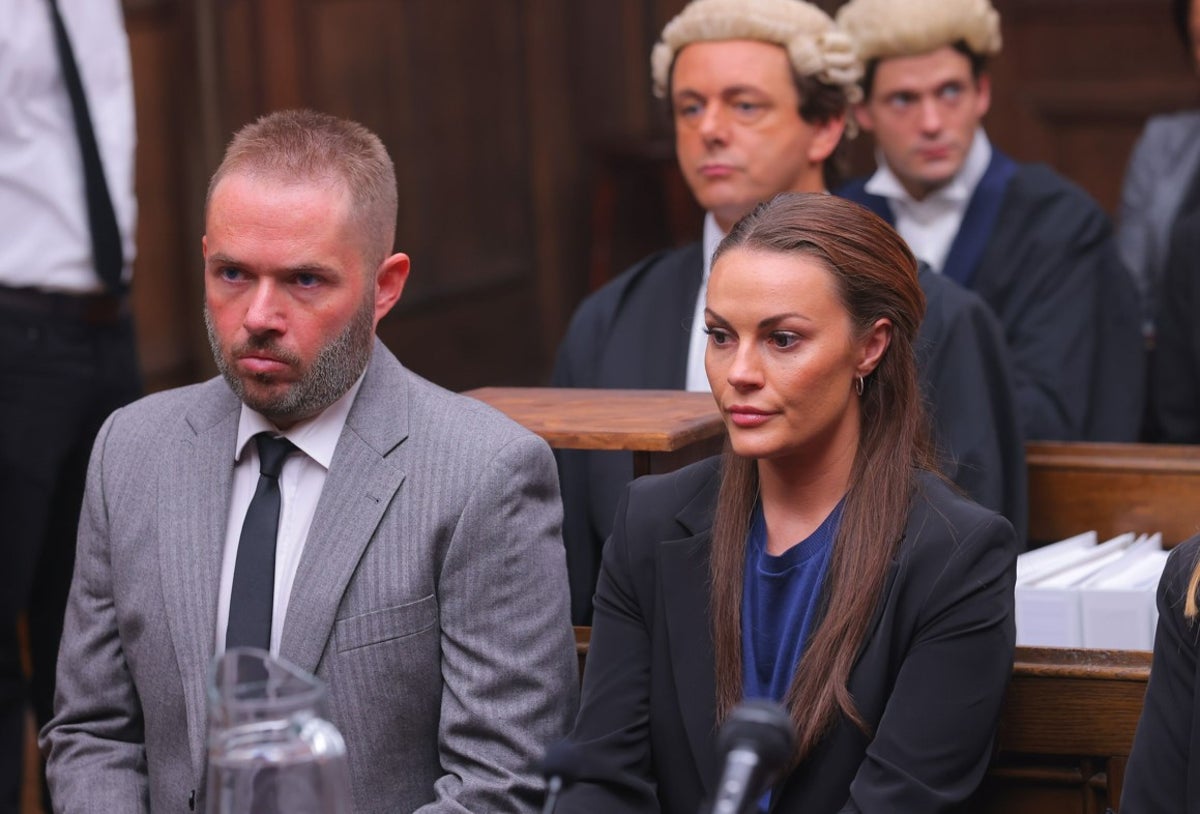
When the term Wag (standing for the Wives And Girlfriends of England’s top footballers) first appeared in British newspapers, it beckoned in a new era of scurrilous journalism. These women – who were unfairly blamed for England’s miserable exit from the World Cup in 2006 – became a perpetual motion machine for tabloid column inches. But when The Book of the Wag is finally written, the story that began with Victoria Beckham and Cheryl Cole will climax with the wives of two former England strikers going head-to-head in the High Court. This is the story of Vardy v Rooney: A Courtroom Drama, Channel 4’s verbatim retelling of the infamous “Wagatha Christie” saga.
But that name was always a misnomer. This story was never a whodunnit. Instead, it was a she said, she said popularity contest played out on a public stage. In the red corner: Coleen Rooney (Trollied’s Chanel Cresswell), wife of ex-England captain Wayne, and victim of leaks about her personal life. In the blue corner: Rebekah Vardy (Game of Thrones’s Natalia Tena), the other half of Leicester City striker Jamie, accused of the grand crime of selling details of Rooney’s home life to The Sun. The stakes here are so low, they’re visible only at eye-level with the carpet.
But, after all, what’s wrong with having a bit of fun with some frivolous nonsense? Well, something, according to the bods at Channel 4. “This is a factual drama,” the opening titles ominously announce, “it has been created from the courtroom transcripts and witness statements.” The use of these transcripts, depositions and other official testimony calls to mind the work of the journalist Richard Norton-Taylor. He dramatised, for the stage, both the Macpherson inquiry, into the murder of Stephen Lawrence, and the Hutton inquiry into the Iraq war, and the precision of that approach added weight to an already weighty subject. The justification here feels flimsier, and perhaps born out of a desire to get the project written, produced and on screens within six months.
What’s missing from Vardy v Rooney is not just the spark of humour that characterised, say, James Graham’s Quiz (about the coughing major scandal on Who Wants to be a Millionaire?) but any sense of emotional insight or revelation. Because however “factual” this might aspire to be, a courtroom is a fundamentally artificial environment – and having actors play out that charade only adds a further layer of artificiality. In place of any real drama, the show simply hopes that having Michael Sheen read “it was like a miniature chipolata” off a court document will elicit sufficient knowing titters.
That desire to tell this story through its own words creates, paradoxically, something that feels deeply and inorganically scripted. Even the off-camera talking heads – from random journalists like Rebecca Twomey and Julian Druker – appear to be read off a sheet of paper. Tena and Cresswell are perfectly serviceable actors, but they’re not helped by bland material and direction that makes them seem, counterintuitively, less cartoonish than their real-life counterparts. Sheen, meanwhile, is as watchable as ever, though he’s wasted delivering lumpen exposition as Rooney’s barrister, David Sherborne (there is some pleasure, however, in seeing him wrap his thespian mouth around the name “Danny Drinkwater” like he’s a character from Dickens).
The mad scramble to bring this story to television screens (the series was announced just a week after the case was concluded) is typical of the laziness of the British TV conveyor belt. “People didn’t know how serious the story behind it was,” weeps Rooney in the closing moments of a drama that never comes close to revealing this hidden gravity. “To be honest with you, I’ve hated every minute of it.” Well, Coleen, I’m with you there. It’s.......... a pile of crap.







